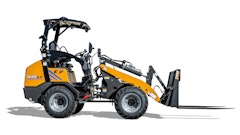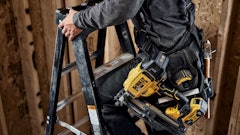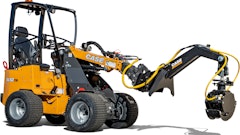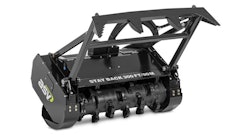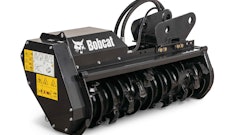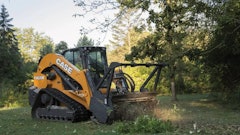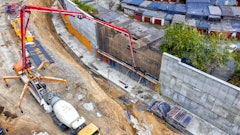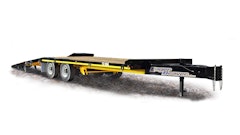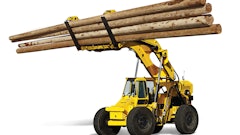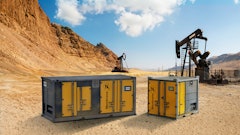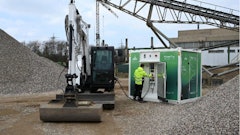
*This content is sponsored by Propane Education & Research Council (PERC)*
Contractors looking for solutions to their labor shortages may have missed one unique option available to them: propane-powered equipment.
Propane helps operators reduce downtime, lower maintenance costs and improve safety and reliability all while meeting and exceeding performance, speed and power with other fuels and easing operator use. All of these can address the ongoing labor concerns that impact on your business.
And those labor concerns aren’t going anywhere anytime soon. According to the Associated Builders and Contractors (ABC), the construction industry must attract more than a half a million added workers this year to catch up to demand.
“Despite sharp increases in interest rates over the past year, the shortage of construction workers will not disappear in the near future,” ABC Chief Economist Anirban Basu says. “First, while single-family home building activity has moderated, many contractors continue to experience substantial demand from a growing number of mega-projects associated with chip manufacturing plants, clean energy facilities and infrastructure. Second, too few younger workers are entering the skilled trades, meaning this is not only a construction labor shortage but also a skills shortage.”
Even if the industry catches up with its hiring goals in 2023, there will still be another 300,000+ people that need to be hired in 2024. Propane could be the answer, says Jim Bunsey, director of commercial business development at the Propane Education and Research Council (PERC). Here’s how propane can help.
Improved efficiency. Refueling propane equipment is easy – swap in a full cylinder wherever you happen to be (in the yard, on the jobsite) and go. That time savings over fueling up at a local station adds up over a long day in the field. Even better, is that propane can be used even on the hottest or coldest days without degradation and air pollution. “Propane is ready and able, regardless of the weather,” Bunsey says. A propane tank can be changed in under 3 minutes.
Reduced downtime. Compared to battery or electric equipment that might need to plug in or recharge for hours or require you to have extra power packs, propane tanks are low-cost and can be swapped on a single piece of equipment without adding expensive backups to your fleet. They’re also easy to maintain. “With propane fuel systems there's a lot less maintenance. "You're not changing clogged fuel filters, you're not getting dirt build-up in the fuel system,” Bunsey says. And they last. According to the Department of Energy, propane’s low oil and carbon contamination result in longer engine life.
Increased safety & reliability. Propane is a reliable and safe fuel. In a market where the number of entry-level construction laborers has increased 72% over the past decade, safety is paramount. If you know you have equipment with safe fuels, hiring in from outside the industry isn’t such a concern. “This is so much better than grabbing a 5-gallon can of gasoline and pouring it into a piece of equipment” says Bunsey. It’s a closed fuel system, so with propane there are no spills. Operators aren’t faced with worrying about the engine being hot and having unintentional ignition.
Assistance with training. Even better, the propane industry, aided by PERC, has prioritized education and certifications on their equipment. The primary required personal protective equipment for propane users is gloves and goggles to prevent cold burns. So contractors don’t need to provide much gear – or training. “People must be trained annually. The training isn't extensive, and you can always go to propane.com for further information. You can see we have all kinds of training programs,” Bunsey says. Also, propane retailers who fill and supply tanks to jobsites often handle training, so the contractor doesn’t have to coordinate it, reducing time away from the job.
Recruitment in new markets. More people might become equipment operators if there were alternatives to diesel – that is, alternatives to fumes and spills and the related dizziness, throat/eye/skin irritation. Propane is clean and the perfect solution for any job where air quality and employee health is a priority. Bunsey also hears it’s the preferred choice of women on the jobsite. Right now, only 7% of the workforce is women, but maybe propane can change that, Bunsey posits. “There are a lot of women who are successful in the construction industry. And you can tell that by the decisions that are being made about the equipment. We’re not doing things just because ‘that's how we've always done it’ anymore. You're seeing a change in the construction industry, and I think it's great.”
What kind of equipment uses propane?
While propane hasn’t yet been used (at least commercially) to power heavy equipment, many jobs contractors do can benefit from propane equipment – mini excavators, skid steers, forklifts, boom and scissor lifts, tractors, mowers, handheld power equipment and more. Heavy equipment could also be coming thanks to a Cummins engine that's coming out that Bunsey says has “diesel-like performance.”
“We’re working with (original equipment manufacturers) to find new hybrid solutions that can be used for heavy machines that are using a lot of energy.”




